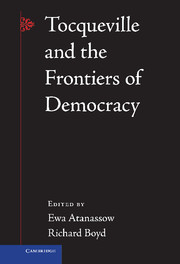Book contents
- Frontmatter
- Contents
- List of Contributors
- Short Title Abbreviations of Tocqueville's Major Works
- Acknowledgments
- Introduction: Tocqueville and the Frontiers of Democracy
- Part One The Meaning of Democracy and the Democratic Revolution
- Part Two Democratization in a Non-Western Context
- Part Three Challenges of Globalization: Democracy, Markets, and Nationhood
- Part Four Democracy, Imperialism, and Foreign Policy
- 10 The Surprising M. Tocqueville: Necessity, Foreign Policy, and Civic Virtue
- 11 Democracy and Domination: Empire, Slavery, and Democratic Corruption in Tocqueville's Thought
- 12 Tocqueville and the Napoleonic Legend
- Part Five Democracy's Old and New Frontiers
- Epilogue: New Frontiers, Old Dilemmas
- Bibliography of Works Cited
- Index
- References
11 - Democracy and Domination: Empire, Slavery, and Democratic Corruption in Tocqueville's Thought
Published online by Cambridge University Press: 05 April 2013
- Frontmatter
- Contents
- List of Contributors
- Short Title Abbreviations of Tocqueville's Major Works
- Acknowledgments
- Introduction: Tocqueville and the Frontiers of Democracy
- Part One The Meaning of Democracy and the Democratic Revolution
- Part Two Democratization in a Non-Western Context
- Part Three Challenges of Globalization: Democracy, Markets, and Nationhood
- Part Four Democracy, Imperialism, and Foreign Policy
- 10 The Surprising M. Tocqueville: Necessity, Foreign Policy, and Civic Virtue
- 11 Democracy and Domination: Empire, Slavery, and Democratic Corruption in Tocqueville's Thought
- 12 Tocqueville and the Napoleonic Legend
- Part Five Democracy's Old and New Frontiers
- Epilogue: New Frontiers, Old Dilemmas
- Bibliography of Works Cited
- Index
- References
Summary
Tocqueville's thought and political career, from his early observations in America, through his advocacy of the French colonization of Algeria, to his late preoccupations with the American political crises of the 1850s, may help us to explore two converse aspects of the relationship between democracy and empire. The first is the temptation to consolidate democratic society internally by exercising forms of domination over outsiders, as when democratic – or democratizing – societies engage in imperial ventures, as all the major European nations and the United States did in the nineteenth and early twentieth centuries. Democracy in settler societies has had a particularly intimate relationship with exclusion and domination: egalitarian relations among settlers have often been fostered by a sense of shared civilizational or racial status and by the abundance of cheap land wrested from indigenous peoples. The second is the destruction that imperial formations wreak not just on the colonized but also on the democratic societies that sponsor them, short-circuiting or corrupting democratic processes. This can happen when forms of arbitrary power exercised in colonies or over slaves come home to roost or when elites co-opt democratic processes for profit or plunder abroad or at the frontier. Jacksonian populism fostered both the rampant abrogation of Indian treaties and the increasing stratification of American society under the operations of the “free market”; British capitalists likewise managed to whip the public into the jingoistic frenzy that supported the Boer War, to the cost of many and the profit of a few.
- Type
- Chapter
- Information
- Tocqueville and the Frontiers of Democracy , pp. 243 - 263Publisher: Cambridge University PressPrint publication year: 2013
References
- 1
- Cited by



